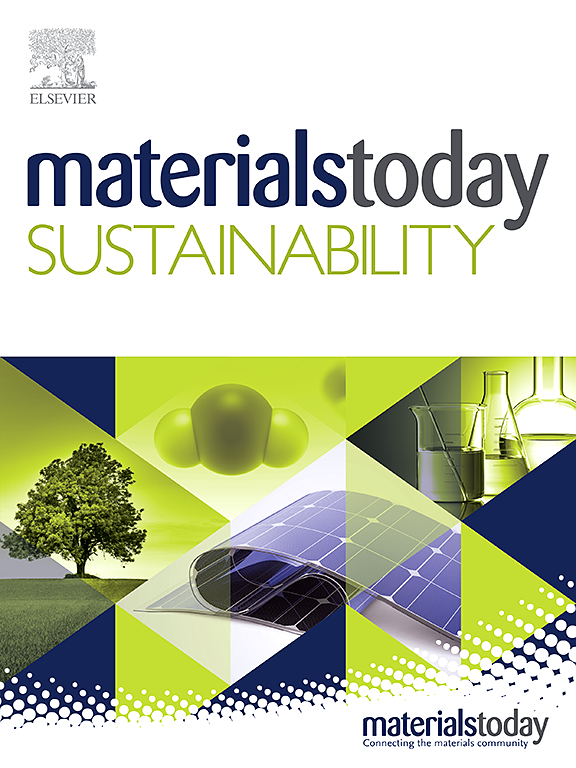利用植物提取物合成绿色纳米颗粒:迈向可持续发展的未来
IF 7.9
3区 材料科学
Q1 GREEN & SUSTAINABLE SCIENCE & TECHNOLOGY
引用次数: 0
摘要
纳米技术正在改变不同的科学领域,然而传统的纳米粒子合成仍然是能源密集型和环境危险的。这推动了向可持续的生物源方法的转变,植物介导的NP合成正在成为一种有希望的替代方法。利用丰富多样的植物源性植物化学物质,如类黄酮、多酚和生物碱,该方法为纳米颗粒生产提供了可持续、经济、环保的途径。然而,尽管具有潜力,关键的挑战仍然存在:植物提取物的不完整表征阻碍了可重复性,对NP形态的控制和大规模实施。虽然许多研究报道了成功的NP合成,但对所涉及的专门代谢物的精确理解仍然缺乏。弥合这一知识差距对于优化NP特性和扩大其生物医学、催化和工业应用至关重要。这篇综述严格审查了特殊植物代谢物在NP合成中的作用,详细介绍了分析技术,如LC-MS, FTIR和NMR,以表征它们。在植物介导的纳米颗粒合成中,可扩展性仍然是一个关键的挑战,其可重复性通常受到非标准化提取方法的限制。协议协调、先进分析工具集成和人工智能(AI)应用等策略可以显著提高一致性和可预测性。最近的出版物趋势表明,人们对绿色合成越来越感兴趣,特别是在医疗保健、食品纳米技术和智能包装方面的应用。解决目前的限制和加深对植物衍生代谢物的理解可以将该领域从经验试验转变为标准化,可扩展和工业上可行的绿色技术,支持可持续材料的发展。本文章由计算机程序翻译,如有差异,请以英文原文为准。
Harnessing plant extracts for green nanoparticle synthesis: Toward a sustainable future
Nanotechnology is revolutionizing diverse scientific fields, yet conventional nanoparticle (NP) synthesis remains energy-intensive and environmentally hazardous. This has fuelled a shift toward sustainable, biogenic approaches, with plant-mediated NP synthesis emerging as a promising alternative. Leveraging the rich diversity of plant-derived phytochemicals, such as flavonoids, polyphenols, and alkaloids, this method offers a sustainable, cost-effective and eco-friendly route to nanoparticle production. However, despite its potential, key challenges remain: the incomplete characterization of plant extracts hampers reproducibility, control over NP morphology, and large-scale implementation. While many studies report successful NP synthesis, a precise understanding of the specialized metabolites involved is still lacking. Bridging this knowledge gap is crucial for optimizing NP properties and expanding their biomedical, catalytic, and industrial applications. This review critically examines the role of specialized plant metabolites in NP synthesis, detailing analytical techniques, such as LC-MS, FTIR, and NMR, for their characterization. Scalability remains a key challenge in plant-mediated nanoparticle synthesis, with reproducibility often limited by non-standardized extraction methods. Strategies such as protocol harmonization, the integration of advanced analytical tools, and the application of artificial intelligence (AI) can significantly enhance consistency and predictability. Recent publication trends show growing interest in green synthesis, particularly in applications across healthcare, food nanotechnology, and smart packaging. Addressing current limitations and deepening the understanding of plant-derived metabolites could shift the field from empirical trials to a standardized, scalable, and industrially viable green technology, supporting the development of sustainable materials.
求助全文
通过发布文献求助,成功后即可免费获取论文全文。
去求助
来源期刊

Materials Today Sustainability
Multiple-
CiteScore
5.80
自引率
6.40%
发文量
174
审稿时长
32 days
期刊介绍:
Materials Today Sustainability is a multi-disciplinary journal covering all aspects of sustainability through materials science.
With a rapidly increasing population with growing demands, materials science has emerged as a critical discipline toward protecting of the environment and ensuring the long term survival of future generations.
 求助内容:
求助内容: 应助结果提醒方式:
应助结果提醒方式:


